businesses expanding into the UK must align with the local Code of Conduct and Ethics, a set of principles enforced by regulatory bodies like the FCA. To ensure compliance and uphold ethical integrity across linguistic barriers, companies use specialized translation services that provide accurate and culturally sensitive translations of this code into various languages. These services are crucial for global businesses to communicate the UK's ethical standards effectively, thereby fostering trust with stakeholders and maintaining a strong brand reputation worldwide. The translation process must be precise, capturing both the literal and cultural context to reflect the UK's legal and ethical nuances, which is essential when expanding into markets like Germany. This ensures that all employees, regardless of language, fully understand the ethical expectations outlined in the code, thereby minimizing legal and reputational risks associated with global operations. By utilizing expert translation services that specialize in the UK Code of Conduct and Ethics, businesses can navigate cross-cultural communication successfully while adhering to international ethical standards.
Navigating the intricacies of corporate ethical standards, particularly in an international business landscape, requires a nuanced understanding and precise communication. This article delves into the critical role of translation services, emphasizing their pivotal function in conveying the UK Code of Conduct and Ethics accurately across different cultures and languages. We will explore how these services bridge cultural divides, ensuring that ethical directives are not just translated but effectively interpreted to maintain integrity and compliance. Through a detailed overview, we will illuminate the key considerations for translating corporate ethical documents from English into other languages, culminating in a case study that showcases the successful application of such translation services by a multinational corporation. Join us as we dissect the nuances and challenges of this process, ensuring that the UK Code of Conduct and Ethics resonates universally while retaining its original intent.
- Understanding the UK Code of Conduct and Ethics: A Comprehensive Overview
- The Role of Translation Services in Bridging Cultural Ethical Standards
- Ensuring Accuracy: Key Considerations for Translating Corporate Ethical Documents from English to Other Languages
- Case Study: Effective Translation of the UK Code of Conduct and Ethics for a Multinational Corporation
Understanding the UK Code of Conduct and Ethics: A Comprehensive Overview

When businesses operate across different countries, adherence to local codes of conduct and ethical standards becomes paramount for legal compliance and reputation management. In the United Kingdom, the UK Code of Conduct and Ethics serves as a foundational guide for corporate behaviour, ensuring that companies uphold principles of integrity, respect, and responsibility. This code is not merely a set of guidelines but a mandatory framework enforced by regulatory bodies, including the Financial Conduct Authority (FCA). Companies must translate these ethical standards into languages appropriate for their workforce and stakeholders, leveraging UK Code of Conduct and Ethics translation services to bridge communication gaps and maintain transparency. These services are instrumental in ensuring that all employees, regardless of language proficiency, understand their roles in upholding the company’s commitment to ethical practices. The translation must capture not only the letter but also the spirit of the original text, as the nuances of ethical conduct often rely on cultural context and specific legal interpretations unique to the UK. By providing clear, accurate translations, businesses can demonstrate their dedication to ethical standards and foster trust with clients, employees, and the broader community. This commitment is not just a matter of compliance but a strategic advantage in building a resilient brand reputation that stands the test of time and global scrutiny.
The Role of Translation Services in Bridging Cultural Ethical Standards

In today’s globalized business environment, the role of translation services has expanded beyond mere linguistic exchange to encompass cultural and ethical nuances. As companies operate on an international scale, adherence to ethical standards becomes a complex endeavor, particularly when navigating different cultural contexts. The UK Code of Conduct and Ethics provides a robust framework for businesses within the United Kingdom, setting out principles that promote integrity, respect, responsibility, and fairness in all aspects of commercial activity. Translation services specializing in this area play a pivotal role in conveying these standards accurately to diverse audiences, ensuring that ethical practices are understood and upheld across different regions and cultures. By providing precise translations, these services enable organizations to maintain a consistent ethical stance while engaging with global partners, suppliers, and stakeholders. This not only fosters trust and reliability but also contributes to the sustainable growth of international business relationships.
Moreover, the task of translating corporate ethical standards is not just about linguistic accuracy; it demands an appreciation of cultural norms and values. Translation services that offer UK Code of Conduct and Ethics translation services must be adept at interpreting these principles within the context of the target language and culture. This involves a deep understanding of both the source and destination cultures’ attitudes towards ethics in business, ensuring that the translated standards resonate with local audiences. Such nuanced translations are instrumental in facilitating cross-cultural communication and understanding, thereby promoting ethical conduct on a global scale. This is particularly important for multinational corporations seeking to operate with integrity and accountability across multiple jurisdictions, where the stakes of miscommunication can be high. With the right translation services, companies can bridge cultural divides and uphold their commitment to ethical standards, ensuring compliance and fostering a global reputation for trustworthiness.
Ensuring Accuracy: Key Considerations for Translating Corporate Ethical Documents from English to Other Languages

When translating corporate ethical standards, particularly from English to other languages, precision becomes paramount. The UK Code of Conduct and Ethics, which outlines the principles and guidelines for ethical behavior within organizations, requires meticulous translation services to retain its integrity across different linguistic and cultural contexts. Firstly, translators must possess a deep understanding of both the source and target languages, coupled with expertise in corporate ethics. This bilingual proficiency ensures that nuances and complex terminology are accurately conveyed, avoiding misinterpretations or loss of meaning that could arise from literal translations.
Secondly, the cultural context is a significant factor in the translation process. Ethical concepts may have different connotations in various cultures, necessitating a tailored approach to translation. Translation services specializing in corporate ethics must consider local regulations and business practices that influence ethical standards within the target language region. Utilizing professional UK Code of Conduct and Ethics translation services that employ native speakers and subject-matter experts is essential to bridge cultural gaps, ensuring that the translated documents resonate with the intended audience while adhering to the original intent and meaning. This not only safeguards the company’s reputation but also ensures compliance with international ethical standards.
Case Study: Effective Translation of the UK Code of Conduct and Ethics for a Multinational Corporation

In an era where global expansion is a strategic imperative for multinational corporations, the precise translation of corporate ethical standards becomes paramount. The UK Code of Conduct and Ethics serves as a foundational document that guides employees in upholding the highest standards of integrity and responsibility. When a multinational corporation operates across different cultures and legal frameworks, translating this code into various languages is not merely a matter of semantics but an essential step to ensure compliance and ethical alignment worldwide. Here, the role of professional translation services becomes crucial; they must convey not only the literal meaning of the text but also the nuanced expectations and underlying moral principles it embodies. For instance, when translating the UK Code of Conduct and Ethics for a multinational corporation with operations in Germany, translators must consider the cultural context and legal requirements that govern ethical conduct in Germany. This involves careful selection of words and phrases that resonate with the local workforce while maintaining the integrity of the original document’s intent. The translation should be idiomatically accurate, culturally sensitive, and legally compliant, ensuring that the code’s guiding principles are universally understood and adhered to by employees in all locations. This not only fosters a culture of ethical behavior but also protects the corporation from potential legal and reputational risks associated with misinterpretation or oversight in cross-cultural communication. Utilizing specialized UK Code of Conduct and Ethics translation services, corporations can navigate these complexities effectively, upholding their commitment to ethical standards across all international branches.
In conclusion, the meticulous translation of corporate ethical standards, such as the UK Code of Conduct and Ethics, is a pivotal aspect of global business operations. This article has illuminated the significance of understanding the nuances of cultural ethical norms and the role translation services play in accurately conveying these principles across languages. The case study underscored how adherence to precise translations facilitates consistent ethical practices within multinational corporations. For organizations looking to navigate the complexities of cross-cultural communication, employing expert translation services for the UK Code of Conduct and Ethics is not just beneficial but indispensable. By doing so, companies can uphold their ethical integrity and foster trust with stakeholders worldwide.



